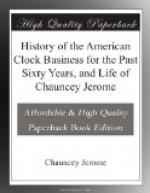companions were. They told me that they had just
heard that the ship Macedonian, which was taken a few
days before from the British by one of our ships,
had just been brought into the harbor and lay off
down by Burling Slip, or in that region. We went
down to see her, and went on board. I was surprised
and frightened to see brains and blood scattered about
on the deck in every direction. This prize was
taken by the gallant Decatur, but a short distance
from New York. Hastening back from this sickening
scene, we resumed our journey. My two companions
had been telling me that we should have to cross the
North River in a boat, and I did not understand how
a boat could be made to carry our team and be perfectly
safe, but when we arrived there, I was much surprised
to see other teams that were to cross over with us,
and a number of people. At that time an old scow
crossed from New York City to the Jersey shore, once
in about two hours. What a great change has taken
place in the last forty-seven years; now large steam
ferry boats are crossing and recrossing, making the
trip in a few minutes. It was the first time
that I had ever crossed a stream, except on a bridge,
and I feared that we might upset and all be drowned,
but no accident happened to us; we landed in safety,
and went on our way rejoicing towards Elizabethtown.
At that place I saw a regiment of soldiers from Kentucky,
who were on their way to the northern frontier to fight
the British. They were a rough set of fellows,
and looked as though they could do a great deal of
fighting. It will be remembered that this was
the time of the last war with England. We passed
on through Elizabethtown and Morristown to Dutch Valley,
where we stopped for the night. We remained at
this place a few days, looking about for a cabinet
shop, or a suitable place to make the clock cases.
Not succeeding, we went a mile further north, to a
place called Schooler’s Mountain; here we found
a building that suited us. It was then the day
before Christmas. The people of that region,
we found, kept that day more strictly than the Sabbath,
and as we were not ready to go to work, we passed Christmas
day indoors feeling very lonely indeed. The next
day we began operations. A young man from the
lower part of New Jersey worked with me all winter.
We boarded ourselves in the same building that we worked
in, I doing all of the house-work and cooking, none
of which was very fine or fancy, our principal food
being pork, potatoes and bread, using our work-bench
for a table. Hard work gave us good appetite.
We would work on an average about fifteen hours a day, the house-work not occupying much of our time. I was then only nineteen years old, and it hardly seems possible that the boys of the present day could pass through such trials and hardships, and live. We worked in this way all winter. When the job was finished, I took my little budget of clothes and started for home. I traveled the first day as




